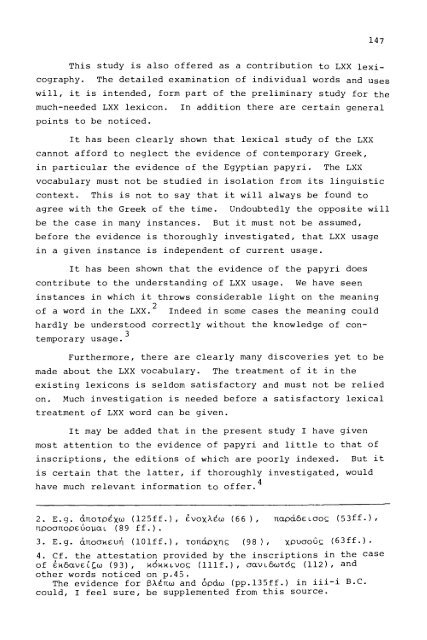A Lexical Study of the Septuagint Version of the Pentateuch
A Lexical Study of the Septuagint Version of the Pentateuch
A Lexical Study of the Septuagint Version of the Pentateuch
Create successful ePaper yourself
Turn your PDF publications into a flip-book with our unique Google optimized e-Paper software.
This study is also <strong>of</strong>fered as a contribution to LXX lexi<br />
cography. The detailed examination <strong>of</strong> individual words and uses<br />
will, it is intended, form part <strong>of</strong> <strong>the</strong> preliminary study for <strong>the</strong><br />
much-needed LXX lexicon. In addition <strong>the</strong>re are certain general<br />
points to be noticed.<br />
It has been clearly shown that lexical study <strong>of</strong> <strong>the</strong> LXX<br />
cannot afford to neglect <strong>the</strong> evidence <strong>of</strong> contemporary Greek,<br />
in particular <strong>the</strong> evidence <strong>of</strong> <strong>the</strong> Egyptian papyri. The LXX<br />
vocabulary must not be studied in isolation from its linguistic<br />
context. This is not to say that it will always be found to<br />
agree with <strong>the</strong> Greek <strong>of</strong> <strong>the</strong> time. Undoubtedly <strong>the</strong> opposite will<br />
be <strong>the</strong> case in many instances. But it must not be assumed,<br />
before <strong>the</strong> evidence is thoroughly investigated, that LXX usage<br />
in a given instance is independent <strong>of</strong> current usage.<br />
It has been shown that <strong>the</strong> evidence <strong>of</strong> <strong>the</strong> papyri does<br />
contribute to <strong>the</strong> understanding <strong>of</strong> LXX usage. We have seen<br />
instances in which it throws considerable light on <strong>the</strong> meaning<br />
2<br />
<strong>of</strong> a word in <strong>the</strong> LXX. Indeed in some cases <strong>the</strong> meaning could<br />
hardly be understood correctly without <strong>the</strong> knowledge <strong>of</strong> con-<br />
3<br />
temporary usage.<br />
Fur<strong>the</strong>rmore, <strong>the</strong>re are clearly many discoveries yet to be<br />
made about <strong>the</strong> LXX vocabulary. The treatment <strong>of</strong> it in <strong>the</strong><br />
existing lexicons is seldom satisfactory and must not be relied<br />
on. Much investigation is needed before a satisfactory lexical<br />
treatment <strong>of</strong> LXX word can be given.<br />
It may be added that in <strong>the</strong> present study I have given<br />
most attention to <strong>the</strong> evidence <strong>of</strong> papyri and little to that <strong>of</strong><br />
inscriptions, <strong>the</strong> editions <strong>of</strong> which are poorly indexed. But it<br />
is certain that <strong>the</strong> latter, if thoroughly investigated, would<br />
4<br />
have much relevant information to <strong>of</strong>fer.<br />
2. E.g. άποτρέχω (125ff.), ένοχλέω (66), παράδεισος (53ff.)><br />
προσπορεύομαι (89 ff.).<br />
3. E.g. αποσκευή (lOlff.), τοπάρχης (98), χρυσούς (63ff.).<br />
4. Cf. <strong>the</strong> attestation provided by <strong>the</strong> inscriptions in <strong>the</strong> case<br />
<strong>of</strong> έκδανείζω (93), κόκκινος (Ulf.), σανιδωτός (112), and<br />
o<strong>the</strong>r words noticed on p,45.<br />
The evidence for βλέπω and όράω (pp.l35ff.) in iii-i B.C.<br />
could, I feel sure, be supplemented from this source.

















